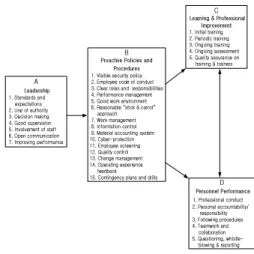Needs for Development of Nuclear Security Culture in Korea
Hye-Won Shim, Hosik Yoo, Sung-Woo Kwack, Ho-jin Lee and Jong-Uk Lee.National Nuclear Security Management & Control Agency 305-600 P.O. Box 114, Yuseong, Daejeon, Korea.
1. Introduction
Over the past several years, the growing international threat of terrorism has necessitated strengthening of physical protection and security of nuclear materials and facilities. A number of countries have made efforts in improving their physical protection system especially in the field of hardware such as security equipment. While security hardware is important, the efficient use of the equipment is yet another important issue, which depends on the operating personnel and their attitudes in performing their duties [1]. Therefore, Security experts said that the nuclear security would not be completed without security culture [1].
However, Nuclear Security Culture has not been introduced and developed in Korea. This paper introduces the concept and model of Nuclear Security Culture and raises awareness of the needs to develop the Nuclear Security Culture in Korea.
2. Security Culture
The International Atomic Energy Agency (IAEA) has promoted the concept of nuclear security culture as a means to improve the physical protection of nuclear materials. The IAEA suggested that all organizations involved in implementing physical protection should give due priority to the security culture, to its development and maintenance necessary to ensure its effective implementation in the entire organization [2]. The culture of an organization or a group consists of the habits of the people in it and the way they generally behave. The cultural approach of the nuclear security is a matter of determining what attitudes and beliefs need to be established in an organization, how these attitudes and beliefs manifest themselves in the behavior of assigned personnel, and how desirable attitudes and beliefs can be transcribed into formal working methods to produce good outcomes, i.e., effective protection [1]. 2.1 Characteristics of security culture
To develop the good culture of security, it is important to understand the properties of a security culture. Every society and organization has its unique culture. Culture normally resides in all learned behavior and in some shaping template or consciousness prior to behavior as well. Therefore, it is difficult to create and change in short period of time.
The government responsible for developing and executing the policy of security should determine what
policies and managements are needed and what should be changed [1]. The government and leaders of organization have difficulties in changing the security culture which has rooted deeply in the society.
2.2 The model of Nuclear Security Culture
The following is the model of Nuclear Security Culture focused in Russia as a case study [1].
Figure 1 An example of security culture mechanism The Security Culture Mechanism depicted in Figure 1 is designed to operate inside the facilities, contributing to a security-conscious environment. Its main element is the performance leadership [1]. Top managers are responsible for developing and implementing a specific set of policies and procedures that shape the behavior of their subordinates [1].
This might be a good model for illustration in this point of time there not being any guidelines of developing the Nuclear Security Culture.
2.3 Development of Nuclear Security Culture in Korea
There has been always a great tension of threat in Korean peninsula due to its geopolitical situation. However, the security culture has not yet been developed in the public. Recently, terrors have been issues and nuclear security has become a public concern in Korea. This is inspiring and encouraging.
The ultimate goal of the nuclear security culture is to achieve the effective and efficient protection of nuclear materials and facilities. Nuclear Security is not a matter of only security personnel but a matter which should be shared in the public.
Transactions of the Korean Nuclear Society Autumn Meeting Busan, Korea, October 27-28, 2005
Nuclear Security has several problems in Korea i.e., the recognition of it is very low and it tends to have low priority when policymakers determine the financial policy.
One of important elements of security culture is the instinctive behavior of personnel [1]. Accordingly, it is important to cultivate the security personnel who retain their enthusiasm for the mission, and are able to instill that passion in those who work for them. It may contribute to preventing insider threat. From this point of view, the following are to be considered:
• Pan-national interests in nuclear security • Development of training program • Promoting the security industries • Promoting the security industries 3. Conclusion
Since nuclear Security is not confined to security personnel, creating Nuclear Security Culture is an effective way of solving the chronic security problems including the insider threat. Not only security personnel but also the whole country should make continuous efforts to develop the good culture of Nuclear Security in Korea.
REFERENCES
[1] Igor Khripunov Nuclear Security Culture: The case of Russia.
[2] International Atomic Energy Agency, Fundamental Principles of Physical Protection of Nuclear Material and Facilities, IAEA GOV-2001-42, 2001
[3] International Atomic Energy Agency, The Physical Protection of Nuclear Material and Nuclear Facilities, INFCIRC/225/Rev. 4. 1999.
